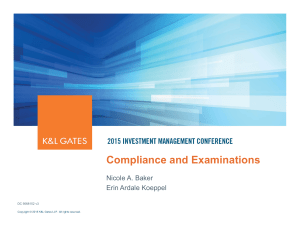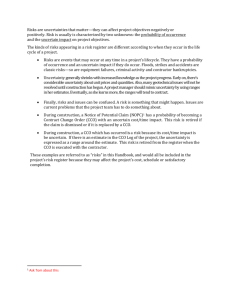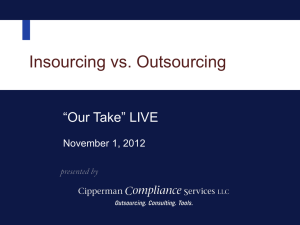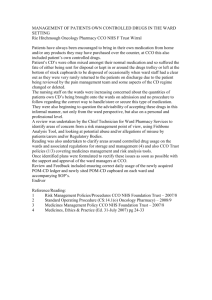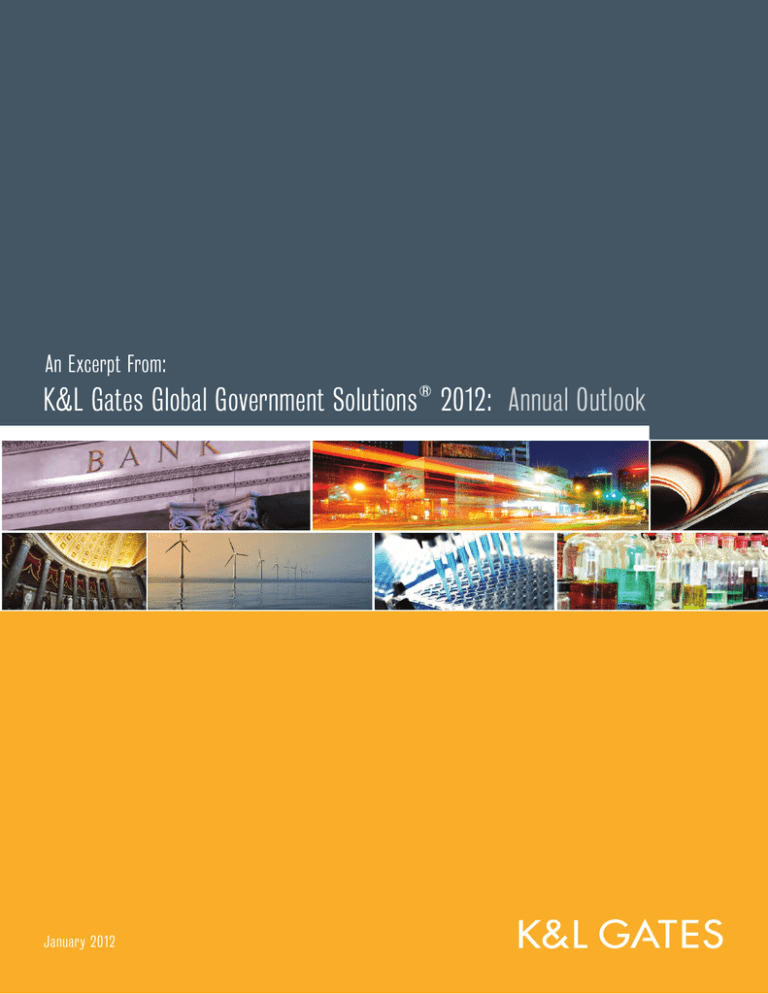
An Excerpt From:
K&L Gates Global Government Solutions ® 2012: Annual Outlook
January 2012
Financial Services
CFTC Proposes Expanded Duties and Liability for Chief Compliance Officers
The Dodd-Frank Act’s amendments to the Commodity Exchange Act (CEA)
require each of the new types of regulated entities dealing with swaps, i.e.,
swap dealers (SDs), major swap participants (MSPs), swap execution facilities
(SEFs), and swap data repositories (SDRs), as well as traditional futures
commission merchants (FCMs), to designate a chief compliance officer (CCO)
to assume responsibility for the entity’s regulatory compliance. Under the statute,
CCOs will have significantly increased responsibilities including, among other
matters, annually self-reporting instances of noncompliance. They will also bear
potential personal liability for an entity’s regulatory compliance.
In seeking to implement this legislation,
the Commodity Futures Trading
Commission (CFTC) has proposed rules
that would aggressively define this
expanded CCO liability. The CFTC
proposals also raise a question about the
scope of a CCO’s right to assert attorneyclient privilege in the context of regulatory
inquiries, which by implication could
call into question whether legal advice
received by a CCO is ever privileged.
The privilege issue is raised expressly in
the proposed rules to govern CCOs of
SEFs and the final rules governing CCOs
of SDRs, but the treatment of the issue
there implies a policy view that might
extend to all CCOs.
14
Action Items for CCOs
Under the proposed rules, the many
responsibilities of a CCO will include
developing and implementing a
compliance manual, code of ethics,
employee training program, a
monitoring and surveillance regime,
and systems for (a) documentation of
transactions and compliance oversight;
(b) recordkeeping; and (c) discipline
and sanctions for noncompliance. The
extensive recordkeeping requirements
under Dodd-Frank will likely require the
maintenance of records of transactions at
every stage of their existence, periodic
position reports, daily values used for
margin and marking positions to market,
and information reported to SDRs and
K&L Gates Global Government Solutions ® 2012 Annual Outlook
trade publications. In addition, a CCO
must prepare and certify an annual report
that discloses:
• the entity’s compliance efforts with
applicable laws and regulations,
and the entity’s own compliance
policies;
• the effectiveness of the entity’s
policies and areas for improvement;
• the resources dedicated to
compliance; and
• any instances of noncompliance
that were identified and how they
were addressed, including any
disciplinary action that may have
been taken.
The CCO’s Role in an Organization
Pursuant to the CFTC’s proposed rules,
the CCO must report directly to the
board of directors or a senior officer.
The CCO must meet with the board
or a senior officer at least annually to
discuss the effectiveness of compliance
policies, and a SEF’s CEO also must
meet at least quarterly with the regulatory
oversight committee. The CCO will
Financial Services
attorney-client privilege. Moreover, as a
practical matter, it potentially could leave
CCOs uninformed or less informed about
sensitive firm matters in circumstances
where risking the loss of confidentiality
for the information by disclosure to the
CCO might be harmful to the entity’s or its
shareholders’ interests.
Conclusion
be considered to be a “principal” of a
registrant, which will require the CCO to
complete the registration forms and pass
the background checks for principals.
The CCO will be subject to the statutory
disqualification standards applicable to
registrants under the CEA.
The requirement for the CCO to ensure
compliance with the CEA and CFTC
regulations raises an issue whether the
CFTC intends for the CCO to be deemed
a line supervisor rather than, as has
been customary, merely an adviser to the
entity on compliance matters, and, if so,
what the extent of a CCO’s supervisory
responsibilities is. The proposed
implementing regulations for CCOs of
SDs and MSPs state that a CCO could
be charged with a failure to supervise
in connection with false, incomplete, or
misleading statements or representations
in the annual report, and that the CCO
or the registrant, or both, either directly or
vicariously, could be subject to criminal
penalties for such false statements.
The proposed SEF CCO regulations
would specify that the CCO cannot act
as the SEF’s general counsel or be a
member of the SEF’s legal department.
The CFTC stated that one basis for
this separation of roles is the CFTC’s
determination that the CCO should not
be able to assert attorney-client privilege
in responding to CFTC information
requests. The CFTC further stated that
while there may be circumstances where
a SEF could assert the privilege, such
circumstances do not include the areas of
responsibility assigned to CCOs by the
CEA or CFTC regulations. The CFTC’s
final rules for SDRs require separation
of the CCO and general counsel roles
in the organization. It remains to be
seen whether this principle also will
be incorporated in the final regulations
governing CCOs for the other swap
entities and FCMs.
The CFTC’s proposed regulations for
swap entity CCOs, if adopted as
proposed, would significantly increase
the responsibilities, legal obligations and
exposure to liability for CCOs beyond
that historically assumed by CCOs of
CFTC and Securities and Exchange
Commission registrants, while at the same
time potentially effectively constraining
their ability to assert privilege with
respect to legal advice. The adoption
of such regulatory requirements would
likely require, as Dodd-Frank and the
CFTC would intend, deploying greater
resources to the compliance function,
but its draconian features may also
significantly limit the pool of qualified
persons willing to assume the role of the
chief compliance officer.
Lawrence B. Patent (Washington, D.C.)
lawrence.patent@klgates.com
Charles R. Mills (Washington, D.C.)
charles.mills@klgates.com
The regulator’s interest in disallowing
privilege for advice given by a CCO is
perhaps understandable, but preventing
a CCO from receiving privileged
advice from the entity’s general counsel
or outside counsel is another matter.
The latter could effectively result in
CCOs acting without legal counsel,
which would seem contrary to the wellrecognized public interest supporting
K&L Gates Global Government Solutions ® 2012 Annual Outlook
15
Anchorage Austin Beijing Berlin Boston Brussels Charleston Charlotte Chicago Dallas Doha Dubai Fort Worth Frankfurt Harrisburg
Hong Kong London Los Angeles Miami Moscow Newark New York Orange County Palo Alto Paris Pittsburgh Portland Raleigh
Research Triangle Park San Diego San Francisco São Paulo Seattle Shanghai Singapore Spokane Taipei Tokyo Warsaw Washington, D.C.
K&L Gates includes lawyers practicing out of 40 offices located in North America, Europe, Asia, South America,
and the Middle East, and represents numerous GLOBAL 500, FORTUNE 100, and FTSE 100 corporations, in
addition to growth and middle market companies, entrepreneurs, capital market participants and public sector
entities. For more information about K&L Gates or its locations and registrations, visit www.klgates.com.
This publication is for informational purposes and does not contain or convey legal advice. The information herein should not be used or relied upon in regard to
any particular facts or circumstances without first consulting a lawyer.
©2012 K&L Gates LLP. All Rights Reserved.

